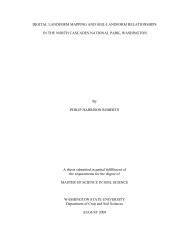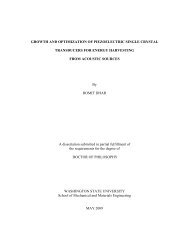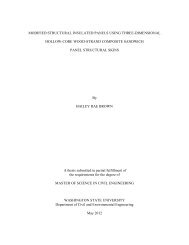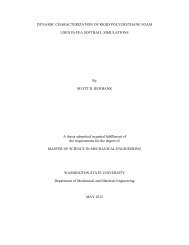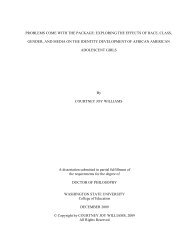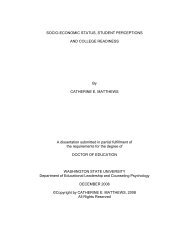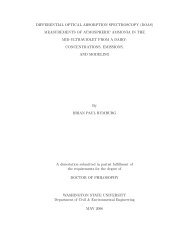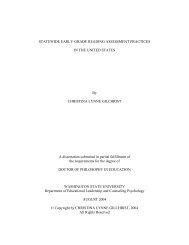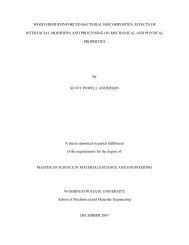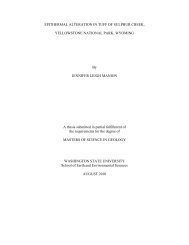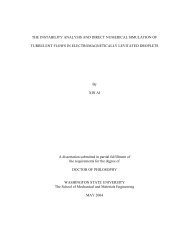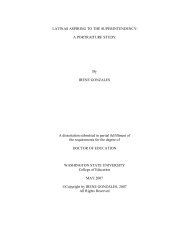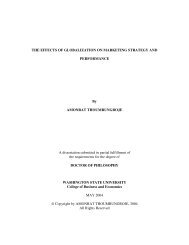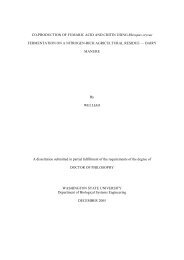the moral reasoning of student athletes and athletic training students
the moral reasoning of student athletes and athletic training students
the moral reasoning of student athletes and athletic training students
You also want an ePaper? Increase the reach of your titles
YUMPU automatically turns print PDFs into web optimized ePapers that Google loves.
Despite <strong>the</strong> research <strong>and</strong> <strong>the</strong> warnings, <strong>athletes</strong> continue to dope. Problems exist with <strong>the</strong><br />
argument that educating <strong>athletes</strong> about <strong>the</strong> negative effects <strong>of</strong> doping is an effective deterrent<br />
(Stoll, Gwebu, & Beller, 2006). Researchers have found that if <strong>athletes</strong> were given a drug that<br />
would enhance performance <strong>and</strong> in five years potentially result in major medical problems such<br />
as cancer, as many as 95% <strong>of</strong> <strong>athletes</strong> reported that <strong>the</strong>y would still be willing to use <strong>the</strong> drug<br />
(Bamberger & Yaeger, 1997; Goldman, 1992). Such a response indicates how 1) <strong>athletes</strong> have<br />
little regard for <strong>the</strong>ir personal health <strong>and</strong> underst<strong>and</strong>ing <strong>of</strong> <strong>the</strong>ir own mortality, 2) <strong>the</strong> drive to<br />
win exceeds competing on one’s own merits, <strong>and</strong> 3) information centered anti-doping education<br />
programs may be ineffective in addressing doping in sport.<br />
The Effects <strong>of</strong> Doping on <strong>the</strong> Moral Integrity <strong>of</strong> Sport<br />
Ano<strong>the</strong>r argument used for banning performance enhancing drugs in sport is that doping<br />
compromises <strong>the</strong> <strong>moral</strong> integrity <strong>of</strong> sport as a whole. In response to <strong>the</strong> growing epidemic <strong>of</strong><br />
doping in sport, <strong>the</strong> International Olympic Committee established <strong>the</strong> World Anti-Doping<br />
Agency (WADA), an organization charged with <strong>the</strong> task <strong>of</strong> st<strong>and</strong>ardizing regulations <strong>and</strong> testing<br />
for all international competitions. The WADA mission statement defines doping as illegal if it is<br />
a health risk, or if it violates <strong>the</strong> “spirit <strong>of</strong> sport.” They define <strong>the</strong> “spirit <strong>of</strong> sport” as an intrinsic<br />
“celebration <strong>of</strong> <strong>the</strong> human spirit, body, <strong>and</strong> mind” that is characterized by <strong>the</strong> following values:<br />
ethics, fair play <strong>and</strong> honesty, health, excellence in performance, character <strong>and</strong> education, fun <strong>and</strong><br />
joy, teamwork, dedication <strong>and</strong> commitment, respect for rules <strong>and</strong> laws, respect or self <strong>and</strong> o<strong>the</strong>r<br />
participants, courage <strong>and</strong> community, <strong>and</strong> solidarity (World Anti-Doping Agency, 2003,<br />
Introduction: The Code). The necessary formation <strong>of</strong> WADA’s, explicit definition <strong>of</strong> <strong>the</strong> spirit <strong>of</strong><br />
sport <strong>and</strong> <strong>the</strong> continually increasing need for change in <strong>the</strong> world <strong>of</strong> sport have come as a<br />
consequence <strong>of</strong> <strong>the</strong> assault on <strong>the</strong> purity <strong>and</strong> <strong>moral</strong> integrity <strong>of</strong> sport.<br />
43



